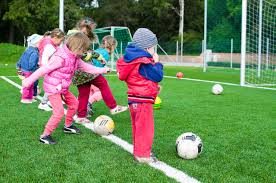
Helping kids of all ages to live a more active life through FUNctional movement.
Welcome to Play On Pediatric Therapy
Call

Developmental Coordination Disorder (also known as dyspraxia) is a condition that affects physical coordination. It causes children to have challenges with daily activities and makes them appear clumsy when they move. Children with DCD often do not recognize similarities between motor tasks which leads to difficulties in transferring their motor learning from one activity to another. So they may be able to catch a large ball but when we switch the ball for a smaller one, they may not be able to transfer their catching skills. They can also have troubles generalizing their motor learning from one scenario to another- for example they may have troubles recognizing that stepping up the curb on a sidewalk is similar to climbing stairs. Finally, changing environments are particularly challenging for children with DCD so avoiding others who are moving while playing can be much more challenging for a child with DCD because they have a hard time monitoring the incoming information from the environment and making their bodies respond in a timely manner.
Up to 5-6% of school aged children are affected by DCD. The ratio of boys to girls varies greatly for this condition from 2:1 to 5:1 though most studies agree that boys are more commonly impacted than girls.
What are the signs of DCD?
👉Challenges with motor skills such as tying shoes, going down stairs, age appropriate pencil skills and self care tasks
👉Difficulties with buttons or zippers (age appropriate)
👉Clumsy or awkward when they move- they might bump into things, they might spill or knock things over frequently
👉Can be delayed in certain gross motor skills like riding a bike, catching a ball, jumping rope
👉They might have troubles with sports as they need to constantly change their body position and adapt to their environment
👉They might show poor postural control or poor balance- they might slouch a lot, can’t sit up straight for long periods of time or may need to hold onto railings
Will my Child Grow Out of DCD?
It is not uncommon that educators or health care professionals say that a child will “grow out of it”, but studies have shown that children with DCD do NOT outgrow their challenges but rather they continue to have difficulties with new age-appropriate tasks. They are more likely to have academic AND behavioral difficulties, low self-esteem, depression, anxiety and are at a greater risk of becoming overweight.
How can Play On Pediatric Therapy help?
Developmental Coordination Disorder is a condition that affects both fine and gross motor skills. This means that both occupational therapy and physiotherapy can help your child to succeed.
Physiotherapy can help by:





Occupational Therapy can help by:





How is DCD Diagnosed in Children?
If any of this applies to your child, it may be time to look into the possibility of Developmental Coordination Disorder. An official diagnosis needs to be provided by a doctor or psychologist often using what’s known as the DSM-5. However, OTs and Physios do assessments that assist in getting a diagnosis. We have specialized assessment equipment for children, and special training to work with your child, regardless of diagnosis or not.
References
Polatajko, H. J., Fox, M., & Missiuna, C. (1995). An international consensus on children with developmental coordination disorder. Canadian Journal of Occupational Therapy, 62, 3-6.
Management of Developmental Coordination Disorder Written by Ivonne Montgomery, MRSc, OT; Stephanie Glegg, PhD Candidate, OT; Giovanna Boniface, MRSc Candidate, OT; & Jill G. Zwicker, PhD, OT, March 2018, https://caot.ca/document/6146/E4P%20DCD%2020182.pdf (accessed Jan. 9, 2023)


Helping kids of all ages to live a more active life through FUNctional movement.
Call us anytime

Recent Comments